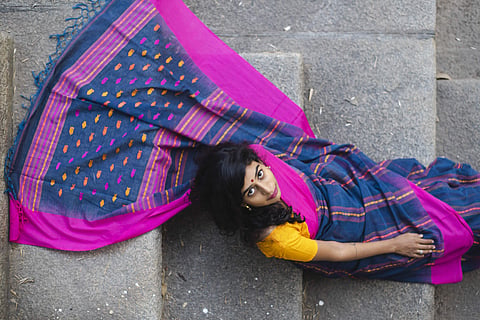
- LIFESTYLE
- FASHION
- FOOD
- ENTERTAINMENT
- EVENTS
- CULTURE
- VIDEOS
- WEB STORIES
- GALLERIES
- GADGETS
- CAR & BIKE
- SOCIETY
- TRAVEL
- NORTH EAST
- INDULGE CONNECT

Emily Chakraborty, Kaisori
While backpacking across India, Emily Chakraborty discovered local handicrafts at every destination she visited. Many of them were on the verge of dying out and could not be found outside their place of origin. This gave Emily the inspiration to launch her own label, Kaisori, with the mission to support local artisans by bringing their work to the cities. “It inspired me to support the cause of Indian craft techniques, organic products, and revive its culture across the urban landscapes of India. I am fiercely passionate about making Indians re-discover their love for art and organic products completely handmade in India,” she shares.
All of Kaisori’s products are exclusively handmade. The brand has tie-ups with local artisans from across the country and features over 25 kinds of craft, from cherial masks to kavad storytelling boxes and Varanasi flying gods. At the core of the label sits a three-member team based out of Bengaluru, which is always on the lookout for new crafts to explore. “Our story of sustainability is at a grass-root level. We believe in creating constant work and growth for [...] the artisans and make this a sustainable and socially responsible venture,” Emily says.
Her approach has helped the dying art of bundi miniature paintings to come to life again. The work of Sonigopal ji, a 62-year-old artist and national award-winner for his paintings, is used for Kaisori’s packaging. With every new kind of craft the brand sells, the demand for Sonigopal ji’s artwork increases. The label is also looking to innovate on existing art forms, such as Jaipur pottery, which they aim to give a new meaning to by using it to create jewellery. Kaisori’s wide range of products is available through their website or through ethical and sustainable pop-ups and exhibitions across India.
Kavya Madappa, Bluecat Paper
Kavya Madappa was running a resort in Coorg when she got the desire to find a sustainable solution for the paper used in bills and brochures. She started researching tree-free paper-making methods and found out that a lot of materials could be used to manufacture paper, including residual waste. “Any material that contains over 60 per cent cellulose can be made into paper. This means that residual waste such as cotton rags, coffee husk etc, instead of ending up in landfills, can actually be up-cycled and turned into paper,” she explains.
After attending a few paper-making workshops, Kavya set up her own brand, Bluecat Paper, which produces tree-free paper from diverse materials ranging from lemongrass to banana and coconut fiber. The Bengaluru-based venture employs a team of paper-makers, designers and screen printers. By creating visually compelling products, they aim to spread awareness about alternative paper-making methods and the fact that up-cycled material can look good. Bluecat’s entire production is based on eco-friendly methods, as Kavya points out: “We are a zero waste factory and are sustainable. Our practices, such as recycling water, not adding chemicals and fair trade, inspire us every day.” Particularly popular are the brand’s wedding cards and stationary items such as notebooks. They are available across Bengaluru in Organic World, Ethic Attic and Go Native, and will soon expand to Mumbai and Chennai as well.
Sahar Mansoor, Bare Necessities
During her studies at the University of Cambridge, Sahar Mansoor first came across the concept of a zero-waste lifestyle and soon decided to adopt it herself. “I wanted to stop being part of the problem. I had to address my own trash problem first,” she shares. While this kind of lifestyle was at the time mostly promoted by the well-heeled in the West, Sahar drew her main motivation from elsewhere: “My inspiration came from conversations with my mum and grandma, asking them what they did back in the day without plastic? A lot of our Indian traditions are actually rooted in ecological practices or what we now can call ‘zero waste practices’”, she shares.
However, Sahar did not stop there. Her Bengaluru-based brand Bare Necessities aims to promote a plastic-free lifestyle by producing everyday essentials made out of sustainable, fair trade and non-GMO material. All products are made by up-cycling and therefore reduce the amount of single-use plastics. The brand claims to have diverted 94,129 kilograms of plastic from landfills in three years of its existence. “Bare necessities is a personal care and home care brand, but it is also my attempt at documenting my zero waste journey and through that process breaking the myths that it is difficult, expensive, time consuming and not-fun! [...] At Bare Necessities, we believe in creating products that care for the environment as much as they care for you,” Sahar sums up the philosophy behind her venture. Bare Necessities also offers counselling for companies who want to go sustainable and conducts local workshops. Some of the brand’s most sought after products include lip balms, soap, dental care and beeswax wraps. All of them come packaged in recycled material or in reusable jars that can be returned when empty in exchange for a discount. Bare Necessities can be found at a wide range of stores and cafes across Bengaluru as well as in many other Indian cities.